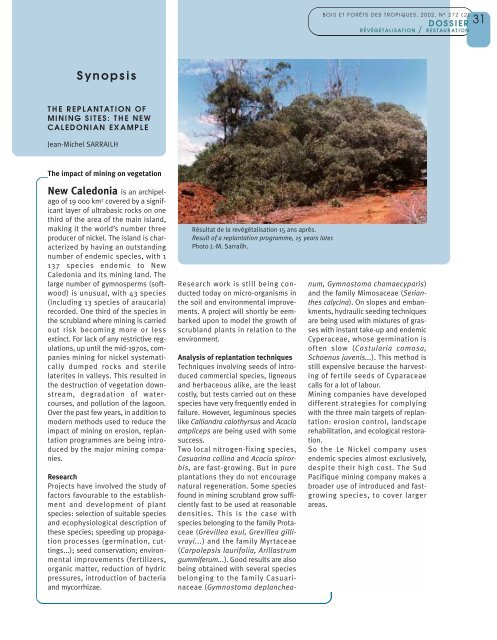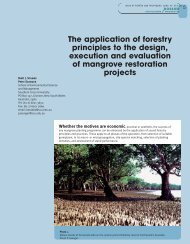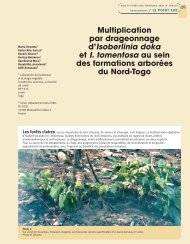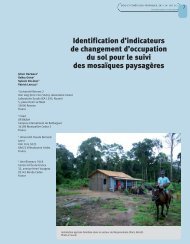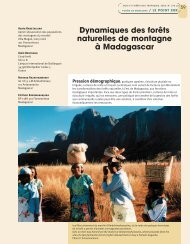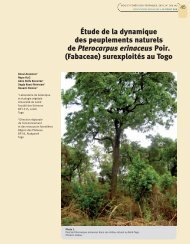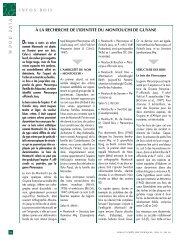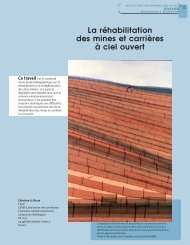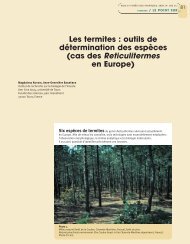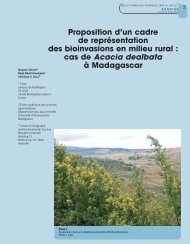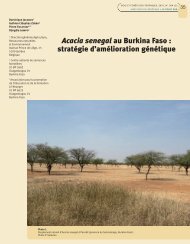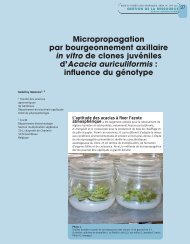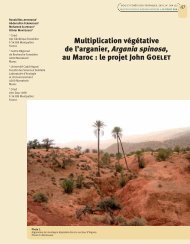Calédonie - Bois et forêts des tropiques - Cirad
Calédonie - Bois et forêts des tropiques - Cirad
Calédonie - Bois et forêts des tropiques - Cirad
- No tags were found...
Create successful ePaper yourself
Turn your PDF publications into a flip-book with our unique Google optimized e-Paper software.
BOIS ET FORÊTS DES TROPIQUES, 2002, N° 272 (2)DOSSIERRÉVÉGÉTALISATION / RESTAURATION31SynopsisTHE REPLANTATION OFMINING SITES: THE NEWCALEDONIAN EXAMPLEJean-Michel SARRAILHThe impact of mining on veg<strong>et</strong>ationNew Caledonia is an archipelagoof 19 000 km 2 covered by a significantlayer of ultrabasic rocks on on<strong>et</strong>hird of the area of the main island,making it the world’s number threeproducer of nickel. The island is characterizedby having an outstandingnumber of endemic species, with 1137 species endemic to NewCaledonia and its mining land. Thelarge number of gymnosperms (softwood)is unusual, with 43 species(including 13 species of araucaria)recorded. One third of the species inthe scrubland where mining is carriedout risk becoming more or lessextinct. For lack of any restrictive regulations,up until the mid-1970s, companiesmining for nickel systematicallydumped rocks and sterilelaterites in valleys. This resulted inthe <strong>des</strong>truction of veg<strong>et</strong>ation downstream,degradation of watercourses,and pollution of the lagoon.Over the past few years, in addition tomodern m<strong>et</strong>hods used to reduce theimpact of mining on erosion, replantationprogrammes are being introducedby the major mining companies.ResearchProjects have involved the study offactors favourable to the establishmentand development of plantspecies: selection of suitable speciesand ecophysiological <strong>des</strong>cription ofthese species; speeding up propagationprocesses (germination, cuttings...);seed conservation; environmentalimprovements (fertilizers,organic matter, reduction of hydricpressures, introduction of bacteriaand mycorrhizae.Résultat de la revégétalisation 15 ans après.Result of a replantation programme, 15 years later.Photo J.-M. Sarrailh.Research work is still being conductedtoday on micro-organisms inthe soil and environmental improvements.A project will shortly be eembarkedupon to model the growth ofscrubland plants in relation to theenvironment.Analysis of replantation techniquesTechniques involving seeds of introducedcommercial species, ligneousand herbaceous alike, are the leastcostly, but tests carried out on thesespecies have very frequently ended infailure. However, leguminous specieslike Calliandra calothyrsus and Acaciaampliceps are being used with somesuccess.Two local nitrogen-fixing species,Casuarina collina and Acacia spirorbis,are fast-growing. But in pureplantations they do not encouragenatural regeneration. Some speciesfound in mining scrubland grow sufficientlyfast to be used at reasonabledensities. This is the case withspecies belonging to the family Protaceae(Grevillea exul, Grevillea gillivrayi...)and the family Myrtaceae(Carpolepsis laurifolia, Arillastrumgummiferum...). Good results are alsobeing obtained with several speciesbelonging to the family Casuarinaceae(Gymnostoma deplancheanum,Gymnostoma chamaecyparis)and the family Mimosaceae (Serianthescalycina). On slopes and embankments,hydraulic seeding techniquesare being used with mixtures of grasseswith instant take-up and endemicCyperaceae, whose germination isoften slow (Costularia comosa,Schoenus juvenis...). This m<strong>et</strong>hod isstill expensive because the harvestingof fertile seeds of Cyparaceaecalls for a lot of labour.Mining companies have developeddifferent strategies for complyingwith the three main targ<strong>et</strong>s of replantation:erosion control, landscaperehabilitation, and ecological restoration.So the Le Nickel company usesendemic species almost exclusively,<strong>des</strong>pite their high cost. The SudPacifique mining company makes abroader use of introduced and fastgrowingspecies, to cover largerareas.


